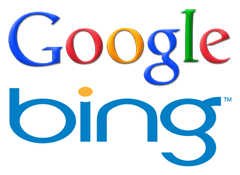Google & Bing (Still) Handle Underscores & Dashes Differently
It’s one of the longest-running SEO questions around, and still something many of us get asked by clients, readers, conference attendees and so forth: Should we use dashes or underscores in our URLs? Google re-opened the discussion recently with a new YouTube video that highlights how Google currently handles dashes and underscores, and also reminds […]
 It’s one of the longest-running SEO questions around, and still something many of us get asked by clients, readers, conference attendees and so forth:
It’s one of the longest-running SEO questions around, and still something many of us get asked by clients, readers, conference attendees and so forth:
Should we use dashes or underscores in our URLs?
Google re-opened the discussion recently with a new YouTube video that highlights how Google currently handles dashes and underscores, and also reminds us that Google and Bing differ on this bit of SEO minutiae.
Many of you will recall this was a pretty hot topic a few years ago when Google originally announced that both dashes and underscores both served as separators, and then backtracked on that statement about a week later, saying it “wasn’t a done deal yet.”
As the new video explains, it’s still not a done deal … and may never be. Google’s Matt Cutts says there’s still a difference between how Google treats underscores in URLs versus how it treats dashes.
In the video, Cutts explains that, when Google sees an underscore in a URL, it joins what’s before and after into one term. “We still join on the underscore and separate on the dash,” he says.
Perhaps most importantly from an SEO perspective, though, Cutts cautions webmasters against rewriting all of their existing URLs just to have dashes rather than underscores because the actual ranking impact is minimal:
It doesn’t make that much difference. It’s what we call a second-order effect. It’s not a primary thing that makes a huge difference.
And that can be considered a best practice, at least where Google is concerned, for the foreseeable future. In the video, Cutts says Google doesn’t have any employees working on changing how it handles underscores and dashes in URLs.
What About Bing & Underscores/Dashes?
In short: It makes no difference to Bing whether you use underscores or dashes in your URLs. A Bing spokesperson confirmed this for us via email today:
We do not differentiate between dash and underscore in our URL ranking features.
That’s the same response we got from Microsoft back in 2007, when Bing was known as Live Search.
So, What Should Webmasters Do?
The same advice that has applied for years still applies today: If you’re just starting on a new website, use dashes if you plan to place keywords in your URLs. Those keywords might provide a minor signal of what the page is about and help a wee bit with rankings. But if you have an existing website that’s already doing well in Google and Bing — pages are indexed, you’re getting quality natural search traffic, etc. — don’t switch from underscore-based URLs to dashes. The potential problems from changing URLs might be worse than the potential gains from having dashes rather than underscores in your URLs.
Contributing authors are invited to create content for Search Engine Land and are chosen for their expertise and contribution to the search community. Our contributors work under the oversight of the editorial staff and contributions are checked for quality and relevance to our readers. The opinions they express are their own.
Related stories